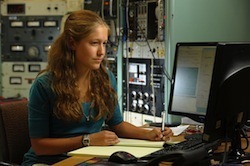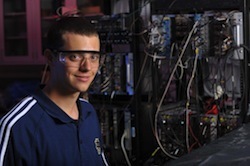
One of the oldest, continually–funded Research Experience for Undergraduates (REU) programs in the country, the Physics REU at the University of Notre Dame is marking its 25th year of National Science Foundation funding this summer.
Each year, the NSF has provided funding for 12 students from other universities while funds from theCollege of Science, other programs and individual faculty research grants have supported about eight students from Notre Dame. The REU started as a regional program, drawing students from five nearby states, but now receives students from as far as California, Pennsylvania, Florida and Arizona. More than 280 undergraduates applied this year for the 12 positions.
The REU program provides realistic research experiences to undergraduate students. The participants work with a faculty mentor on a research project for 10 weeks and are exposed to physics research in other areas via weekly seminars, workshops, interactions with other participants, and field trips to nearby national laboratories. They prepare a research report at the end of the program and make oral presentations at the REU–RET Symposium.

“Many of those students are now professors of physics,” says Umesh Garg, director of the REU program since 2000. “Several of our current graduate students are REU graduates, and over the years we have had many students who have chosen to come to Notre Dame. Many of them would not have known Notre Dame if it had not been for the REU.”
The program originated informally in the mid–1980s, when professors of physics Bruce Bunker and Randy Ruchti invited students to work in their labs during the summer. Terry Rettig directed the program from its formal beginning in 1987 until 2000. Physics faculty mentors have always been available for the undergraduates, says Garg, who matches applicants’ skills and interests to laboratories’ needs. “My aim is they have a good research experience in something they want to do, and they can do,” he says. “A lot of time is spent just training them. Our faculty has made a conscious decision that this is good for the field and the department. We also want to make sure that the students get real research projects.”
A recent extension of the program and the more recent Research Experience for Teachers (RET) will provide $1.4 million in the next five years, an increase of 22 percent. Over the 25–year history, the REU program has brought more than 400 undergraduate students from across the country to work with faculty in the Department of Physics.